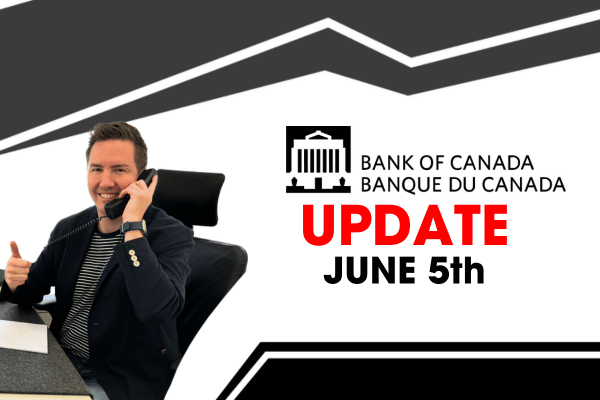Clinton joins Todd Veinotte for this special news update on a Toronto news announcement about a potential big drop in prices in the coming months. Clinton gives his take on what that means for Nova Scotians, and gives refinance advice.
CTV Morning Live: Mortgage advice – October 21, 2019
Clinton Wilkins sits down with Ana Almeida from CTV Morning Live to answer viewers’ questions and to talk about mortgage application advice.
Don’t feel like watching the video? Check out the mortgage application advice video transcript below.
Transcript:
Mortgage application advice
Ana: [00:00:00] Applying for a mortgage will be one of the most important financial decisions you’ll make in your life. So you need to make sure that you’re well versed and ready for the responsibilities associated with getting a loan. This morning, Clinton Wilkins is back on the couch to answer some of our questions. Great to see you already taken your brain. So let’s get into it because we have really great viewer questions, So let’s start off with Katie McDonald. OK. She is wondering, is it possible to get a mortgage without great credit? And are their interest rates? Are they higher because of that?
Can I get a mortgage without great credit?
Clinton: [00:00:34] I think it’s a great question. We get asked this question all the time. And I think the perception of a mortgage broker is sometimes you go to a mortgage broker when you can’t be approved at your branch. But I really think it’s the smart consumers that are going to unbiased mortgage professionals because we have access to many different lenders. But for example, someone that might not have the best credit, there’s really three things that makeup mortgage lending, its income, its assets, and its credit.
And every single Canadian can get a mortgage. But obviously, if it’s not as favorable of a file, maybe there’s more skin that they need to have in the game. So we do mortgages for people that have, you know, shaky credit all the time, but sometimes they need 20 percent down 25 percent. Thirty-five or maybe even 50 percent down. And yes, the interest rate would be higher if the credit’s not good. But we’re looking at these files every single day. And oftentimes we’re able to make small adjustments to the credit that maybe we can do a couple of steps and get them to where they need to be.
Ana: [00:01:25] Okay. Well, that really answers those questions for Katie. Okay. So Greg is up next. His name is Greg Alward. And he asks, what is a mortgage brokers’ responsibility to the client?
More about mortgage brokers
Clinton: [00:01:34] I think that’s a great question. And I get really asked that question all the time. Yeah, my bias is really with our consumers versus with the lender. The way that I look at it is that we lend our consumers to the lender for a period of time. And the typical mortgage term is five years. Yes. So we will get involved with the funding. And then when it comes up for renewal, we’re going to get involved again. So really, we’re looking at making sure that the clients protected, but also get the best rate in terms of their specific situation. I think that’s one of the great things about coming to a mortgage professional. Because I’m not biased to one lender, we’re really biased to the consumer.
Ana: [00:02:04] And I love that you create such a nice relationship with the people that you’re helping.
Clinton: [00:02:08] It’s the biggest purchase of your life. That’s really the biggest debt of your life. So for us to be involved, you know, it’s great to have someone on your side.
Ana: [00:02:15] Yeah, definitely. And what are the closing costs, any hidden maybe that we should consider before making this big purchase?
What about closing costs?
Clinton: [00:02:21] Typically, we say the rule of thumb is if you have 3 percent of the purchase price for your closing costs, that’s the right number. So in H.R.M, The Halifax, Regional Municipality, The D transfer tax is 1.5 percent of the purchase price right now and different, different municipalities. The D transfer tax is different. So if for some it’s one in a quarter or some bits one percent. So it’s really checking with your realtor, making sure and your lawyer what the deed transfer taxes is really a great thing to start with because that’s always like one of those hidden costs about. Yeah, but there’s also legal fees, property tax adjustments, oil adjustments, hooking hookups.
Ana: [00:02:55] It’s like little thing ads that just add up. And I was going to ask about the lawyer fees. Is there anything that we should expect beyond maybe just inspections?
Clinton: [00:03:03] Well, I think that you need to ask your lawyer what the closing costs are going to be because they can give you trial adjustments, which will show really what the legal fees are, what their costs are going to be. And you can’t forget about the HST. It’s one of those things that always keeps on popping up and people sometimes forget about that. So I think really having more money put aside versus less I think is always important. And when we work through a pre-approval with our consumer, we do a kind of trial adjustment to show you what do we think the closing costs will be. Just so you know that you have more than enough set-aside.
Ana: [00:03:34] That’s great, so it’s not a big surprise. Later on, it’s very nice. Okay. And we kind of touched on down payments, but what is the minimum down payment?
What’s the minimum down payment?
Clinton: [00:03:40] So the minimum down payment in Canada is 5 percent. So even if you are if you owned a home before, you can still buy a home with as little as 5 percent down. As long as it is your owner-occupied property, any anytime you put down less than 20 percent, you need to have insurance from the Canadian Morgan Housing Corporation, which is a Crown Corp Jan Worth or Canada Guarantee. OK. But as of November 1st, anybody who makes a purchase and we’re qualifying clients now, they can take advantage of the federal program. So for a resale home, the government will kick in another 5 percent of the equity. On a new construction property, They’ll kick in 10 percent. So it’s definitely something that you should talk about when you’re going through your pre-approval.
Ana: [00:04:16] Wow. OK. And my last question is, So obviously, life goes on. Things happen out of your control. So what if you lose your job or things change within, you know, within your life, things happen, breakups, this and that.
What about the worst-case scenario?
Clinton: [00:04:30] You know what? And that’s what happens all the time. And I think the stat in Canada is about 50 percent of people go through a divorce or separation in their life. I mean, we’ve all been through breakups, I’m sure you can imagine. We really like to meet with our clients once a year to do an annual review just to see what’s changed, because, you know, there are so many things that do change. And oftentimes we’re able to pivot or maybe help with a refinance or renewal that might fail to really help them out. You know, a big portion of our business has a family component. So we see a lot of clients that are going through that type of. And we love to help people through the challenging times because we really think it’s a relationship business.
Ana: [00:05:04] You were so nice. Thank you much for coming in!
Clinton: [00:05:06] I can’t wait to be back.
Ana: [00:05:07] I know. Well, me too. You’re always full of great information. Thank you so much for helping us. It is the biggest purchase of our life.
Clinton: [00:05:13] And feel free to write it. And I know we’ll be back to answer some more questions!
Ana: [00:05:16] Great. Thank you!
Looking for more information or other mortgage application advice? Feel free to contact us!


